The content marketing industry is continuing to evolve, and the trends that appear mingle with other faces of the marketing. SEO is an important asset and facet of the marketing domain. SEO and content marketing should always be best friends, one should not live without the other.
That’s how we come to the idea of searching the trends in content marketing which influence SEO so as to know what to expect and how to place ourselves on the wave and not against it.

With so many trends to choose from the content marketing area, we had a hard time narrowing down the ones that will have a high impact on SEO, but nevertheless, here they are:
- Natural Language Search
- Bite-Sized Content Revolution
- Personalized Content Experiences
- Content Creation Process Has Reconfigured Its Steps
- Content Marketing Will Be Written Only for Content Marketers
- Context Is the New Era of SEO
- Influencer Marketing Has More Power
- Customers Expect Full Transparency
- Video Content Is the Most Preferred Type of Content
- Native Advertising Is Rising Rapidly
Having such a handful list of goodies, it’s time to make the content marketing strategy, prepare our tools and get to work. Now that we are passed the springtime and we’re heading into the sunny summer, we have to be prepared, otherwise, we risk getting burnt. We don’t need just suncream but also our bag of knowledge and the life ring to help us stay above the water.
1. Natural Language Search
These last years, voice search started to increase viciously. According to Search Engine Watch, Google voice search queries in 2016 are up 35x over 2008.
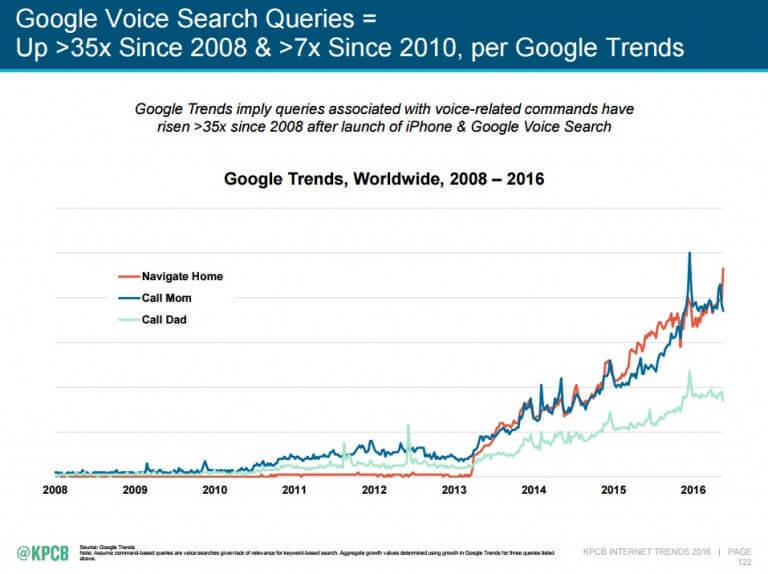
41% of adults conduct at least one search per day, and that number will keep rising. By 2020, voice searches are expected to account for 50% of all online queries, which is up from 30% than 2016, according to SEO Expert.
Google said that 20% of mobile searches on Google are now voice searches. This trend has a high influence on SEO. In the screenshot below you can see how much the voice search accounts from all the searches performed on the search engines.
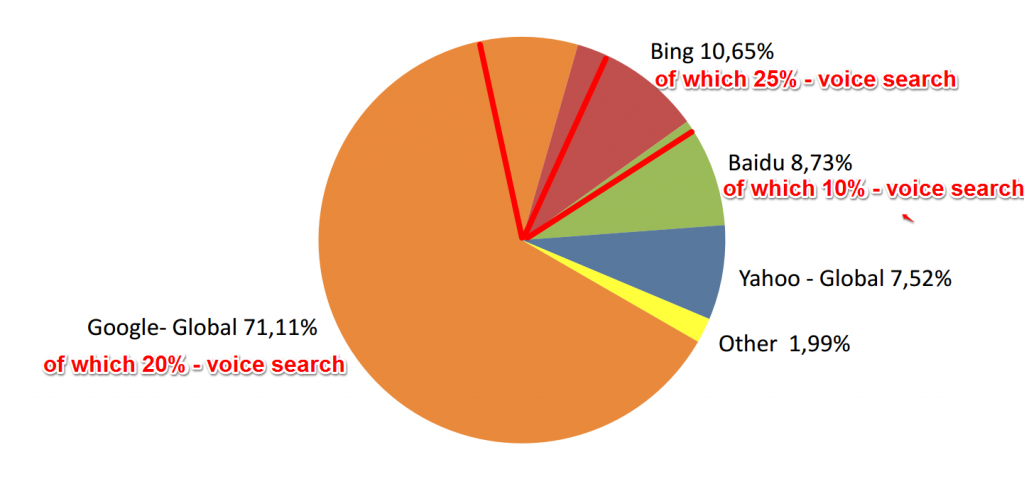
The printscreen is taken from a study on the effect of voice search on SEO we conducted some time ago (more exactly in September 2017). You would be surprised what we discovered!
We performed some searches in Google trends to understand the evolution and to have a clearer understanding of how voice search can revolutionize the SEO world (and if that’s a true fact).
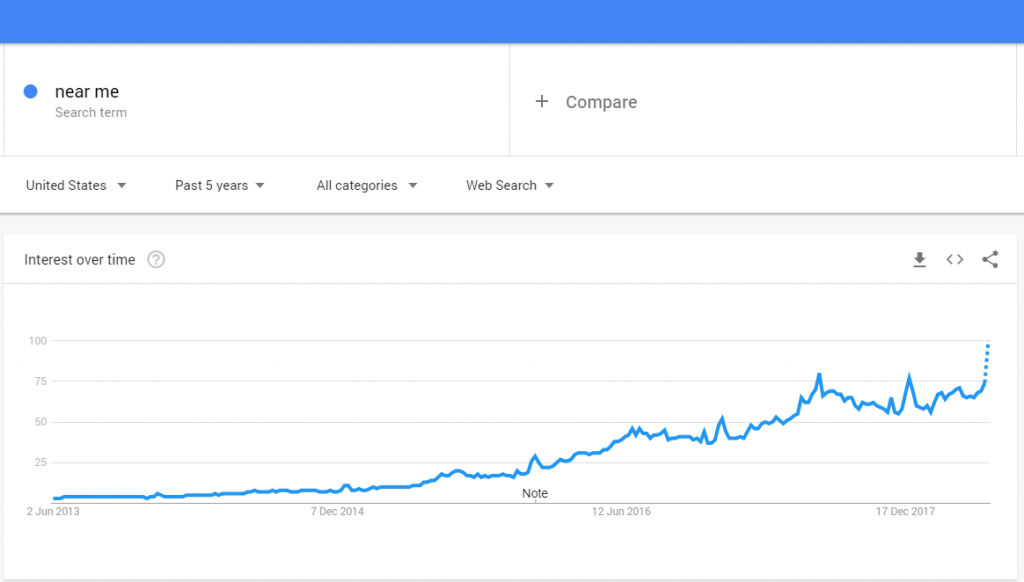
We then added some other search terms to compare. We wanted to see if there is a difference between an organical growth and an explosive one.
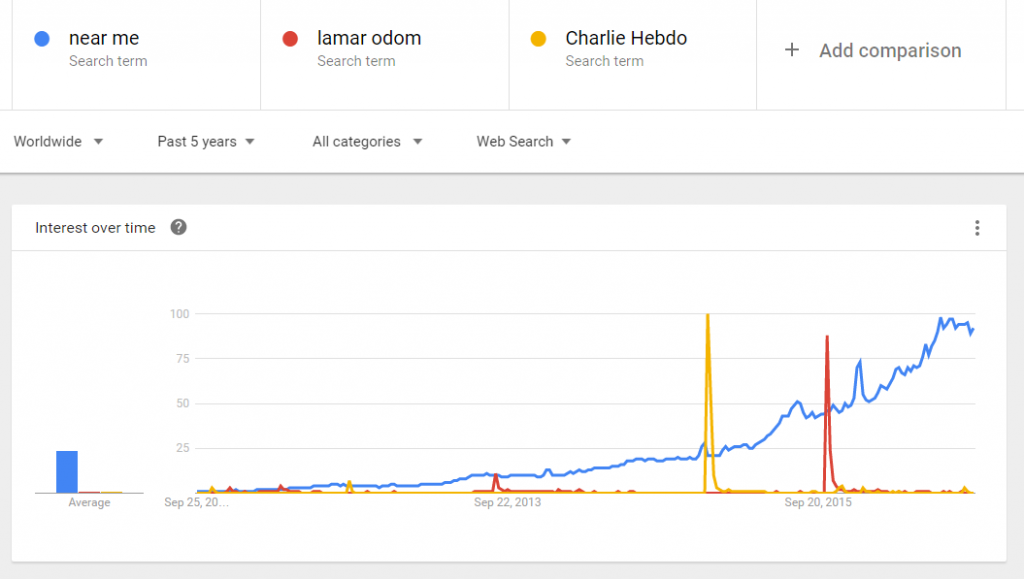
We discovered that SEO was on the safe side, but not for long. We can still use our SEO and digital marketing knowledge as the voice revolution might be close but not yet underway.
As a recommendation, I would suggest using natural language and create relevant content that is easy to read, just like you are talking with somebody and not over-optimizing for the sake of SEO “success”.
When asking a question in your article, try to respond to it in a full sentence, giving a specific response and make it easy to skim. Try using a conversational tone in your content and optimize for long phrases or even questions. Keyword tool has an option which allows you to receive a recommendation based on your search terms. And you can choose to see all the questions and the metrics attached to them.
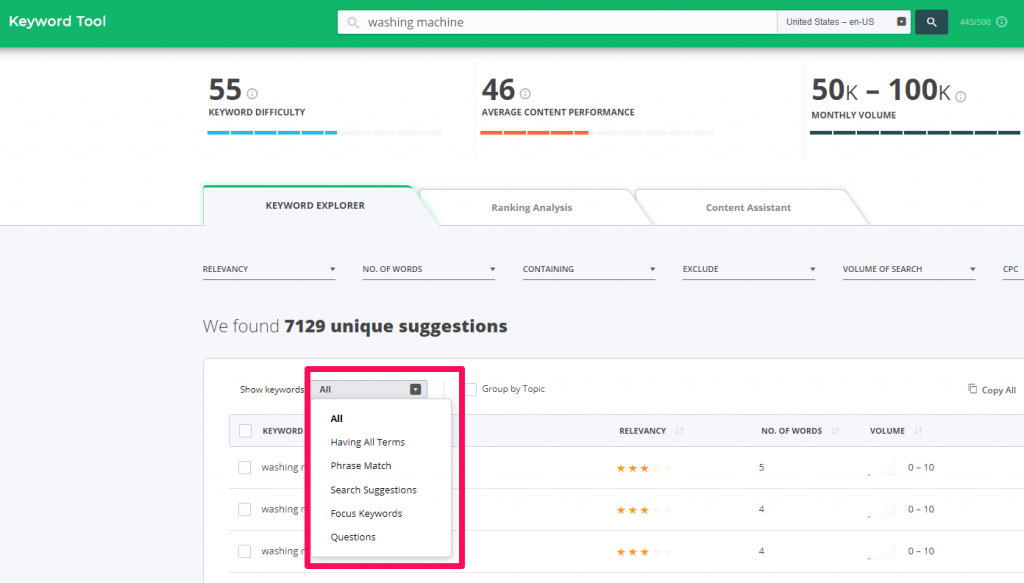
Some other thing you should do is optimizing for local searches since they started to take a hike in searches. As you could see from our study on voice search, there were a lot of “near me” searches.
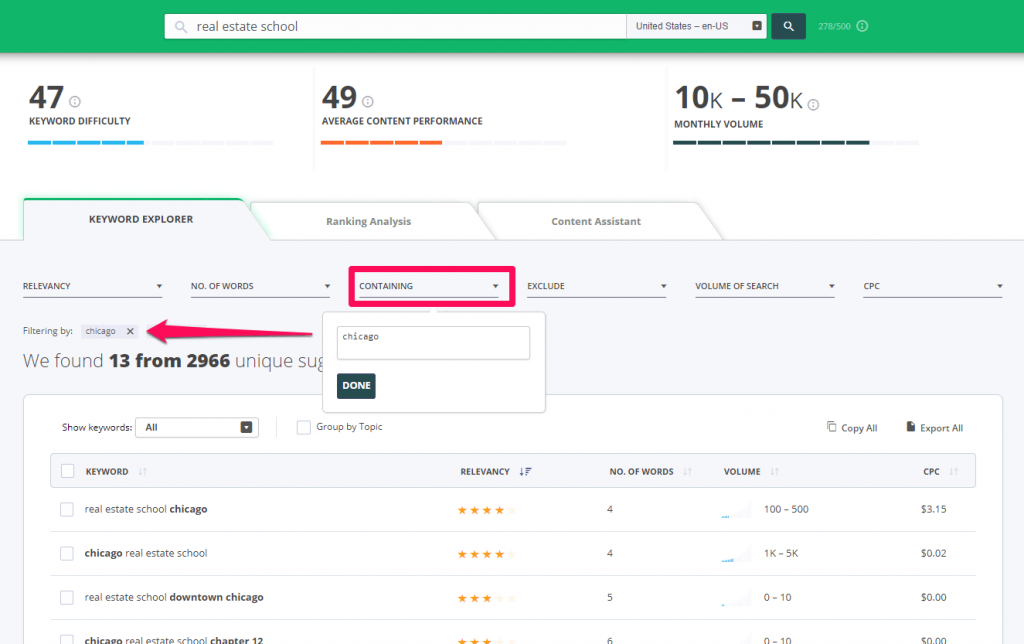
2. Bite-Sized Content Revolution
The length of a piece of content has always been a topic of discussion. Bite-sized content changed the way we consume media. Twitter revolutionized the way information was distributed. You had a limitation of 140 characters so that tweets could fit into single SMS messages. Then they increased to the limit to 280 characters. It was the only time the company increased the number of Tweets, for parity in language. According to their researchers, 9% of tweets reach the character limit in English compared to the Japanese, which was only 0.4%.
The way we write and use social media marketing to share information changed the way we read and consume content, as well. And that’s got a strong effect on content marketing and content marketers. Bite-sized content has lots of advantages such as fighting against boredom, and it is easier to remember because it is the essential, and it is adaptable to the readers.
Bite-sized content works very well for those who are avid users of social networks and news readers or those who are used to find chunks of information at their fingertips. Millenials are maybe the biggest consumers of such type of content.
You should follow the “bite-sized content” trend if you want to attract other categories of readers. Or in case you are used to serve long content with lots of points and topic of discussion, such as listicles and cover a larger audience.
If you want to nail this trend down and explore it to get the wave of readers, you should try to cover the news and other information that is fresh, by offering more value and more information in an easy-to-read article.
3. Personalized Content Experiences
Personalized content is the new buzzword in the content marketing world. Studies have shown that this year we’ll have more content than before, and this story has been around for some years. Several dozens of pieces of content might be published until the end of this year.
For example, Domo, the American software company which specializes in business intelligence software, performed their research and shared the results through their Data Never Sleeps 5 project (the fifth year since it started). In the graph below you can see how much data is flooding the internet every minute of the day.
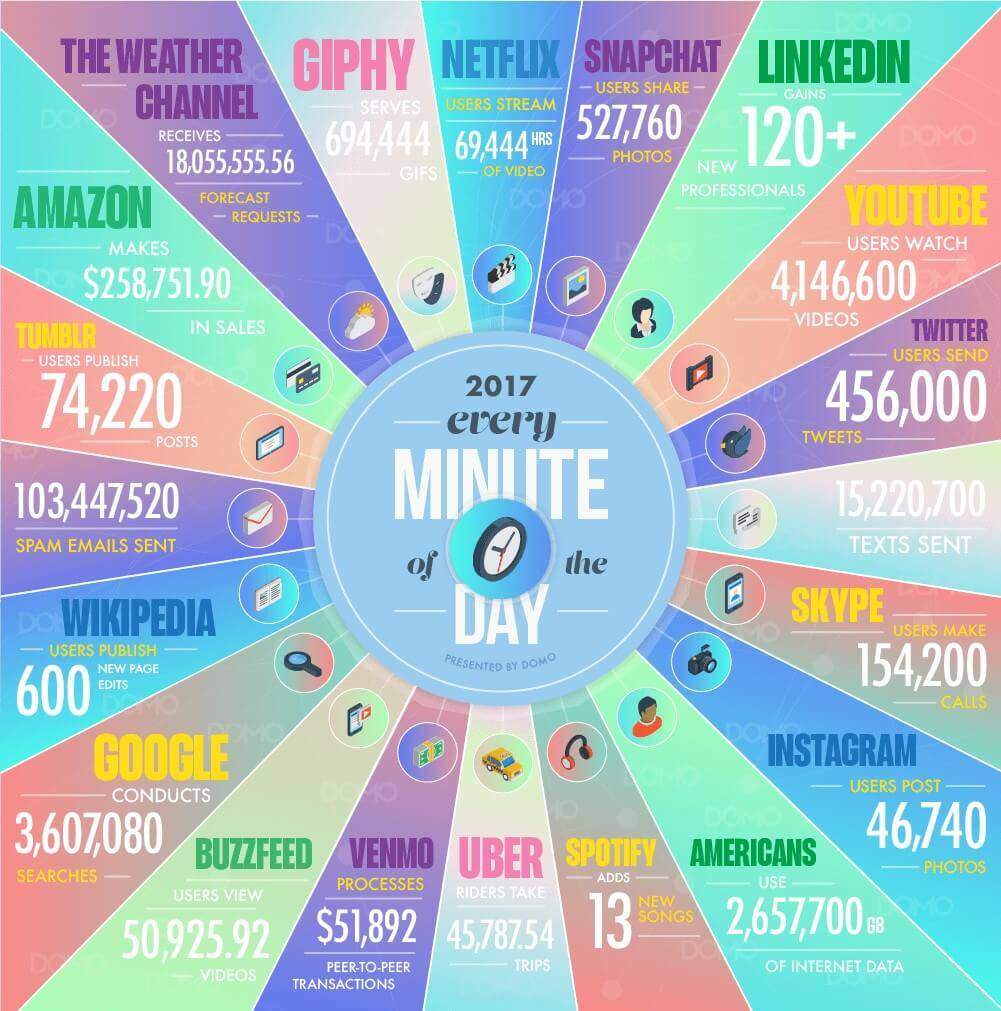
Source: www.domo.com
That being said, with all the data coming around and bombarding the reader with information from all sides, your content must stand out. That’s how the personalized content appeared. The readers feel important when you address them in person.
A study by Demand Metric shows that personalized content is more effective than “un-personalized” content. 80 percent of marketers agree.
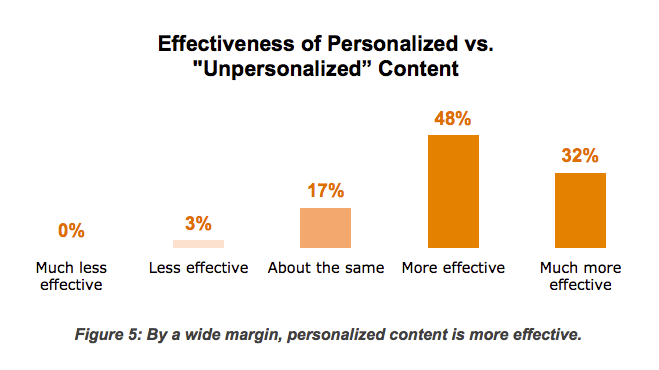
Source: cdn2.hubspot.net
Personalization has started to become critical in the future of content marketing. It is a content marketing trend that has a big influence on SEO. That means more appropriate content for each user, based on their last searches on site, on their last activity on social media, on the actions taken on site and so on.
For example, one user downloads an e-book from your site. Next time you could offer similar e-books, or you could welcome them by name on your site. Go further, and send them personalized emails. It is more personal, and you get a chance to fulfill your readers’ needs.
Adidas used the personalization technique to send different emails to women and men, which was very smart and appealed better to each gender. Below you can see an example:
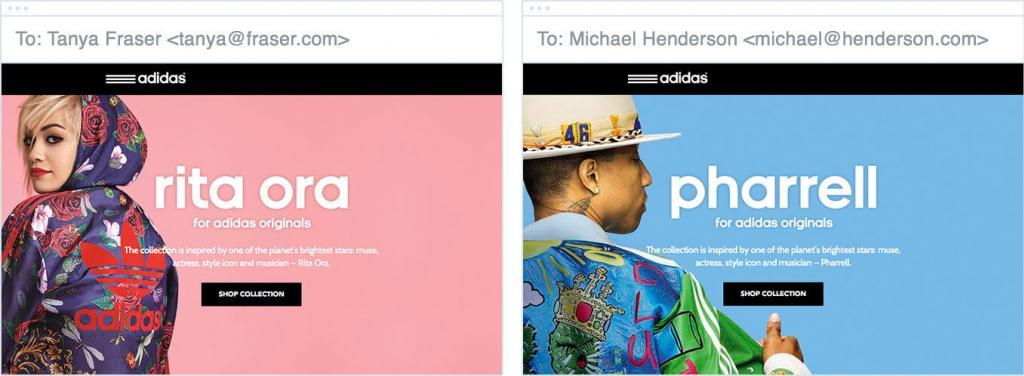
Source: www.campaignmonitor.com
Personalized emails experienced an increase of 26% open rate. And the nice part is that everyone can take advantage of this technique. And this is just one example. You can create content only for your users, or you can offer special prices for them, depending on your digital business.
For example, Answer applies special discounts in the checkout step for users who are the in VIP club, meaning those who passed their first purchase.
If you’re using personalized content, you’ll have higher scores and in the end, a strong and good impact on SEO. Not to mention you’ll improve the user experience. You’ll need to rely on automatization and create segments, and collect behavioral data to maximize your SEO efforts.
4. Content Creation Process Has Reconfigured Its Steps
We all know that people used content creation by starting with a keyword they wanted to rank for (usually a long tail one, to get a high volume of traffic) and creating content around it. The deceiving part of this content creation process was that it started to attract a lot of thin content just for the sake of ranking high in Google, with no intention of serving the user.
The content creation process changed and now follows a more natural and more user-friendly path. Now you have to start with finding a problem and getting the answers to that through your content. Then perform a keyword search for your topic, optimize it, promote it and so on.
If a few years ago people started with the keyword, now they are beginning with the topic by looking on social media sites; forums or client’s questions, reviews, feedback, comments or support questions. There is a lot of content at the moment, and having an article that addresses a pertinent question and has answers to readers’ needs, will secure you a safe place in Google. It is a necessity. Following high rankings in Google with no value content is no longer an option.
Google trends is an option for following popular topics, based on their searches. Follow popular websites in your industry, or follow trending hashtags on Twitter.
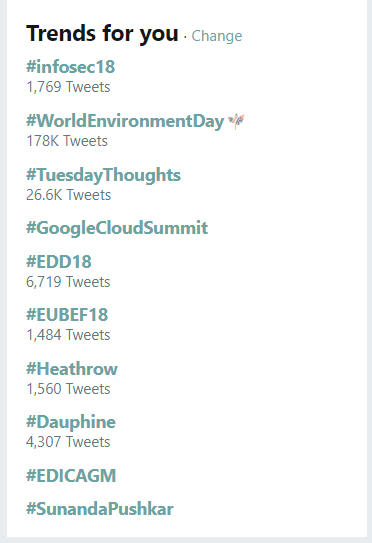
Some other way to get ideas would be to steal the spotlight from your competitors. cogntiviveSEO Social Visibility tool has an option to see the competitors’ content that works best on each social media channel:
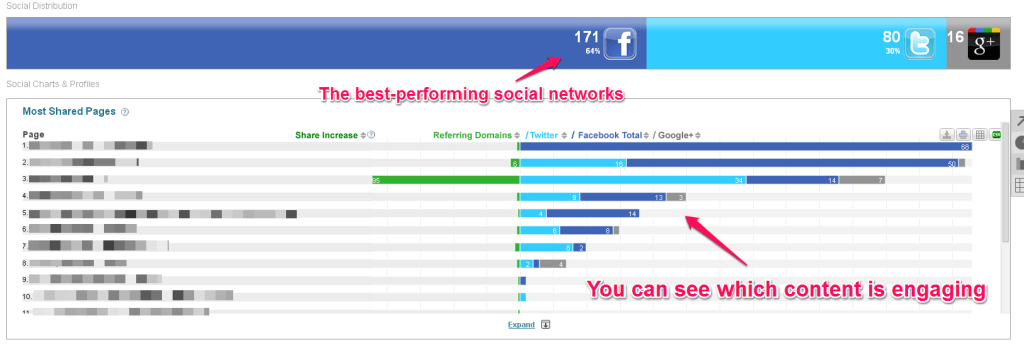
The new content creation process can bring you lots of benefits if you try to respond to the questions and needs of your audience, instead of following keywords to rank for with no value-added.
5. Content Marketing Will Be Written Only for Content Marketers
We are living hard times, especially in the content marketing world. Unfortunately, content marketing is starting to be addressed to content marketers. How will this affect SEO you might ask? Tremendously.
Joe Lazauskas had numerous talks about the fact that he is writing content for content marketers.
| I create content about content marketing for content marketing to other content marketers. | |
| Joe Lazauskas | |
| Editor in Chief at Contently | |
The Marketoonist even made a nice illustration on the topic.
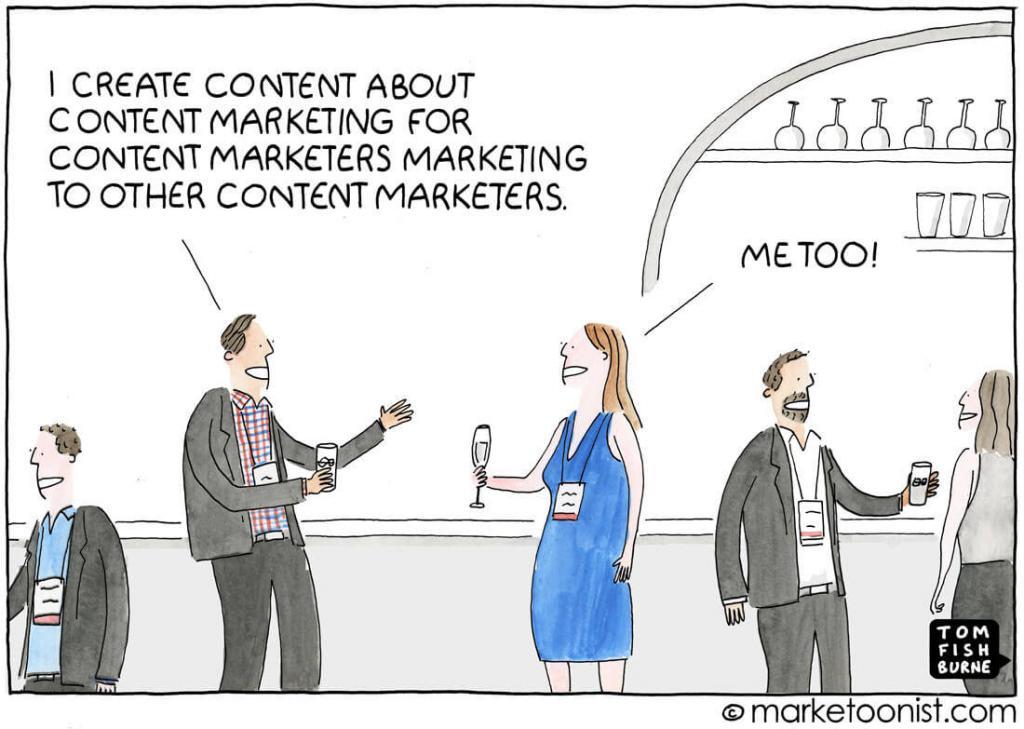
We got to the point where there is so much content written from one minute to another, that I’m sure a lot of content is rewritten in some parts. Let’s think of it this way. You go to a conference where lots of experts gather and start talking on a topic, and for sure multiple ideas will pop-up and at least 5 people will write about what was discussed. Each has a unique style, that’s for sure, but inevitably some ideas will be similar. You can’t avoid it.
On top of that, there are a lot of people who use tools for rewriting content that already exist on the web. That falls into the dark hat category. We all know that article spinning is not accepted.
If you are using this technique, you are putting your website in danger. Instead, if you’re trying to offer valuable content and write content for the content marketers, you must keep up with it. There is a high competition out here, you must have information that educates the audience and offers engaging content. Attract and retain your potential customers. You must be prepared to play in the big league. Don’t write what is already there. Make it personal and talk from your experience.
6. Context Is the New Era of SEO
A new trend is embracing the content culture and the knowledge-sharing industry. It is about the patents that talk about context and how search will change its form. The trend started with the saying “context is king”. After all the time we heard content is king, now the times changed and a new concept will rule the whole kingdom.
Google’s attention on the user intent when searching started to have a high significance because context is something beyond keywords. Now, Google is trying to focus on user intent to offer more accurate and personalized results. We discussed previously the patents that concern the context topic and we discovered the role it has and if it can impact SEO.
Through context, Google aims to show topical search results, which is very well exemplified in the next screenshot:
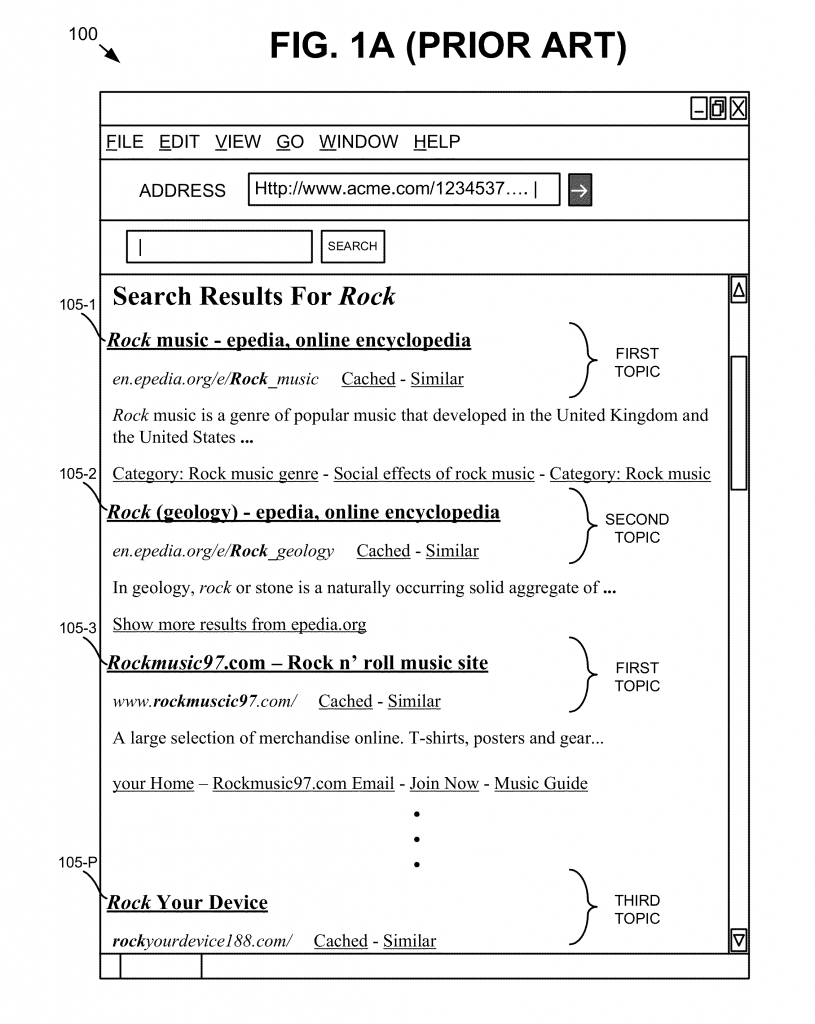
After we explored the patent and tested out ourselves to see how search results look like, we thought of the implications it might have on search engine optimization.
We should focus on lots of other indicators, besides keywords. We need to create a relationship between terms and concepts in content. For example, if we are writing about “Volleyball rules”, then you need to think of all the keywords and phrases that are related to your topic and include them there. Make sure you think of the users’ intent. What are they trying to find out? What are their questions? And try to offer responses in a friendly tone, depending on your topic.
The content must answer to the title. You should use synonyms of your title, and not repeat the focus keyword hundreds of times.
7. Influencer Marketing Has More Power
Influencer marketing will dominate in 2018. According to a study by Nielsen, 83% of consumers trust recommendations from their peers over advertising. People trust recommendations from individuals over brands. Another research on the same topic by NoGre, a graduate education community, says that 88% of consumers trust online recommendations as much as personal ones.
Lots of brands already use influencers for promoting their services, because influencers influence the decisions of the people who follow them. Besides that, they bring a lot of benefits, such as:
- Influencers can produce more shareable content for brands;
- Brand-influencer relationship can be a long-lasting partnership;
- Influencer campaigns can spread across multiples platforms to achieve a wider range of influencers;
- Influencers sharing qualitative images and original content;
Gal Gadot has become the CEO (Chief Experience Officer) of Huawei; she is also the ambassador of the latest handset. She appeared in their video marketing campaigns and she published social media content from Huawei smartphone as you can see in the next screenshot:
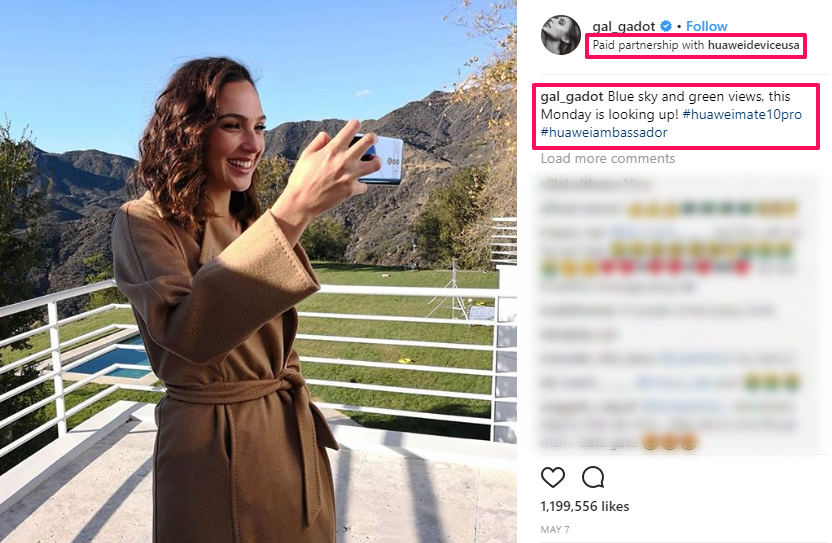
Visual content is highly appreaciated by users and due to the type of product, they had a lot to gain from their collaboration with the actress.
Another interesting campaign we’ve discovered from Huawei was in a collaboration with the presenter of Asia Express in Romania. Asia is a place with lots of beautiful and intriguing experience and Huawei Mate 10 Pro was the great companion for taking the best shots of the show through the eyes of the presenter on Instagram. You could follow the path of the competition by following the hashtag #huaweimate10pro (and #asiaexpress).
Below you can see some screenshots:
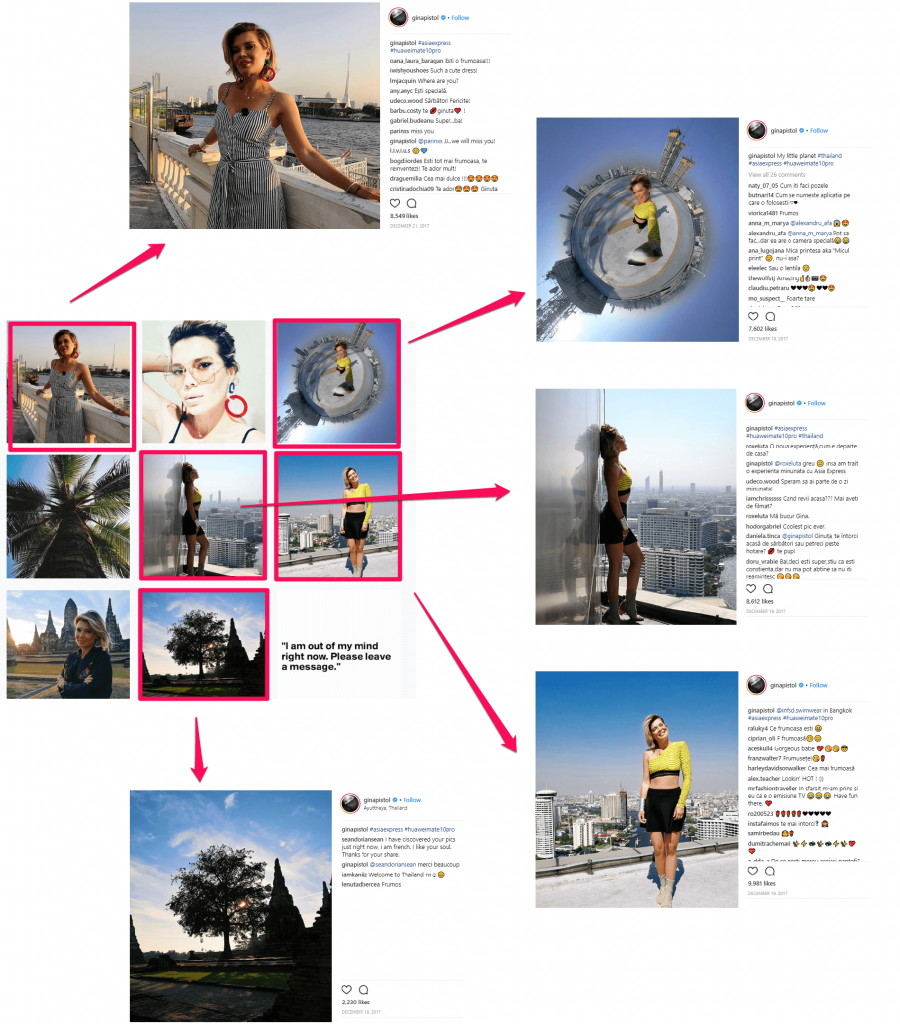
Lots of the pictures were part of the Huawei campaign and all of them had the hashtag #huaweimate10pro.
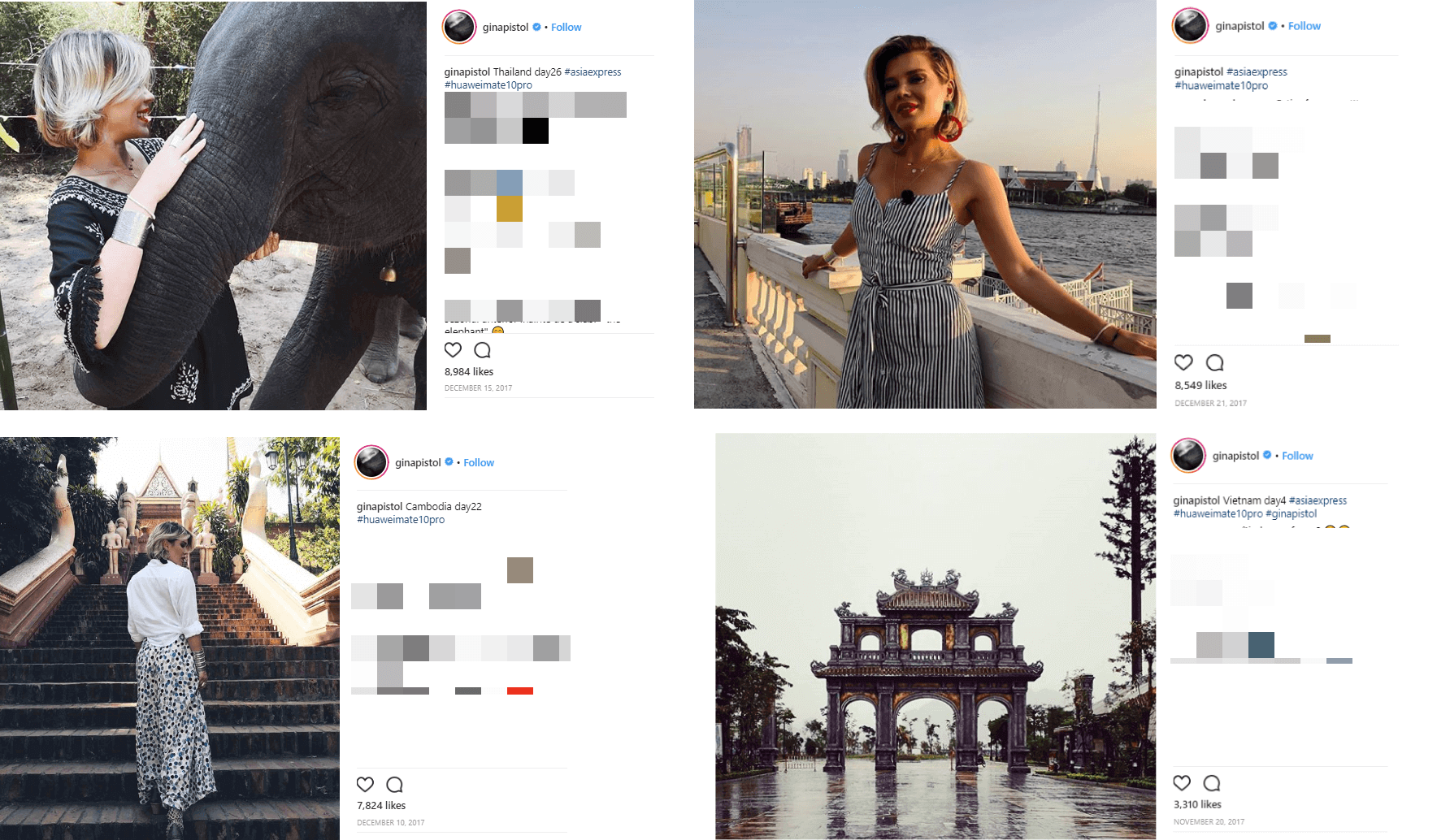
The marketing tactic Huawei follows, by collaborating with influencers, leads to fulfilling their marketing purposes by driving traffic and sales. These examples are well-known and effective practices and they can give high flexibility to the brand to promote the product or service through an influencer. It generates quality content, and you can offer related information and accurate digital content through content curation.
SEO can have a lot to gain from the influencer marketing trend because you can create articles and content to support your campaign and explain what you did and create a story around it. Not to mention, if you have an innovative idea, you can create word-of-mouth and lots of links will “flood” your backlink profile.
8. Full Transparency for a Beter Customer Experience
The Global Trust in Advertising survey by Nielsen, developed in 2015, shows that Europe has the lowest trust rate in advertising compared with the other continents. That explains, on the other side, the reason of the GDPR existence. This change can improve people’s trust and create a better world on the web.
Below you can see the results of the research:
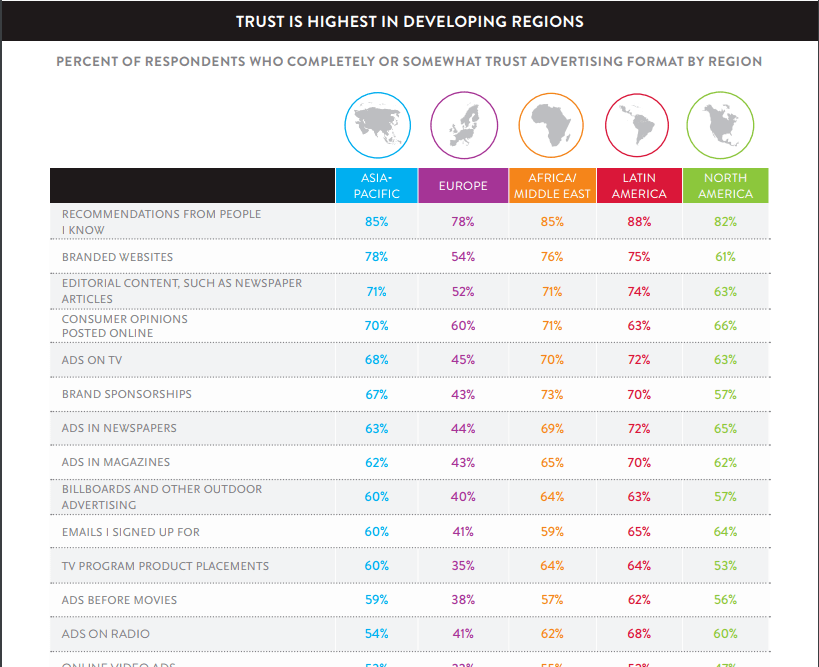
The EU General Data Protection Regulation (GDPR) created a lot of fuss. We are still new to this change and how it affects the website and business owners. Until 25 May 2018, all websites had to update their policy for transparency and let users know what & how their data would be used by publishers.
Lots of webmasters sent emails to users to give their consent to continue using the website. Also, when accessing the site for the first time, you had to give your consent before reading the content.
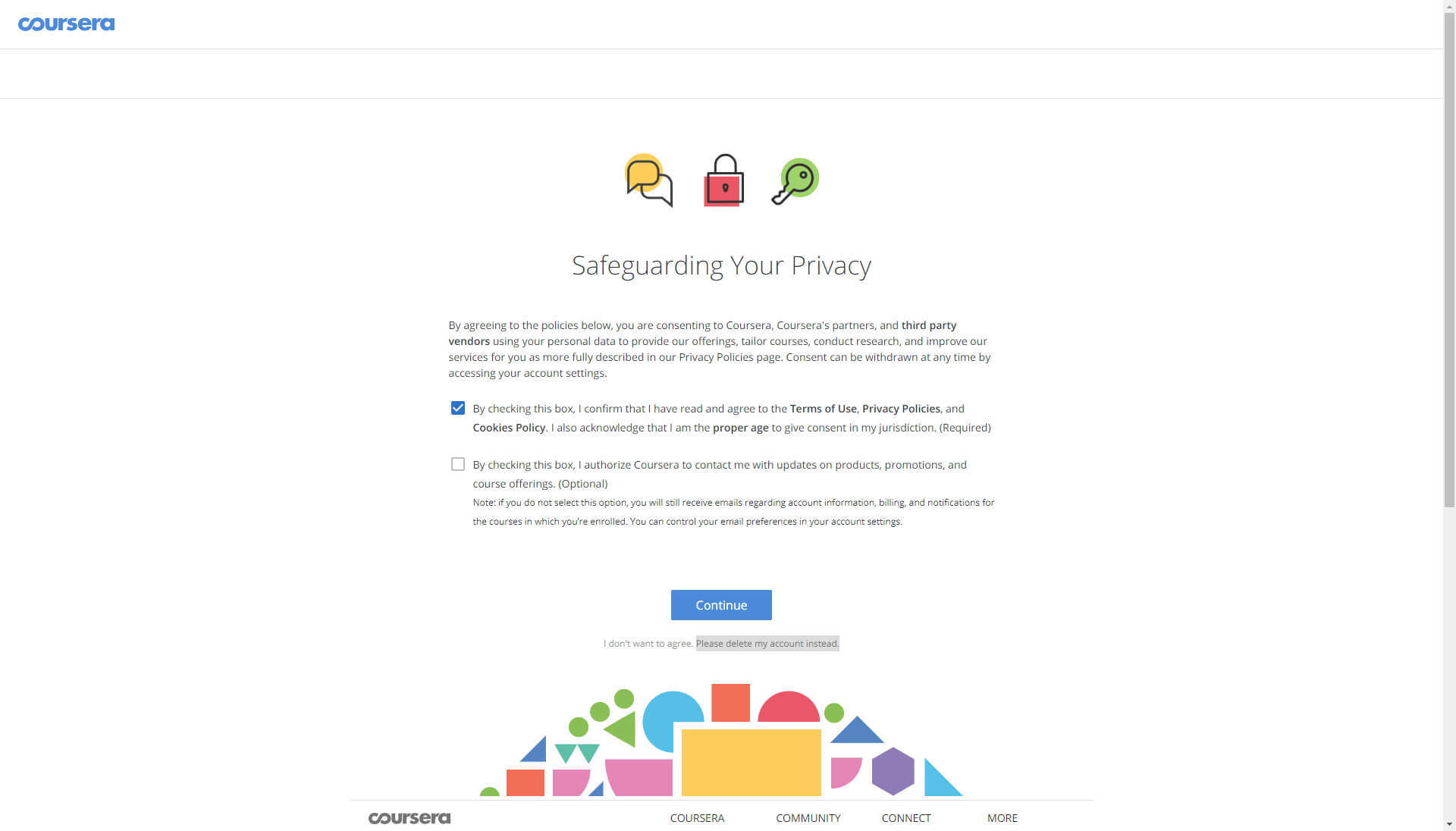
The fact is that customers expect transparency and feel safe knowing what information you are using, whom you give it to and what they can share or not. At the beginning, there might be people that will avoid doing so and search for another page, but there will be some that will update their preferences and remain, and others that won’t lose time and accept in a second.
9. Video Content Is the Most Preferred Type of Content
Video consumption has tremendously increased in volume in the last year. Here are some interesting stats to understand the dimension of the idea:
- YouTube has over a billion users, almost one-third of total internet users;
- 87% of online marketers use video content (OutBrain);
- Having a video on a landing page can increase conversion by 80% (EyeView);
- Demo viewers of a product are 1.81x more likely to purchase than non-viewers (DMB Adobe);
- 51% of marketing professionals worldwide name video as the content format with the best ROI (Insivia).
And these are only a few numbers. There are lots of other studies and analyses that show video is one of the most effective and engaging types of content. Video content has become the most preferred forms of content, for sure. According to a study by Outbrain, 86% of marketers prefer video, instead of blog posts, slideshows, articles or others.
We already took advantage of this trend, as lots of other experts and brand did, by creating podcasts and learning videos for those who want to know more about SEO and marketing.
cognitiveSEO talks are interviews with experts on the industry that we tackle with on lots of ideas on how to create a better company, to increase traffic, to become better specialists and follow insights on their success story.
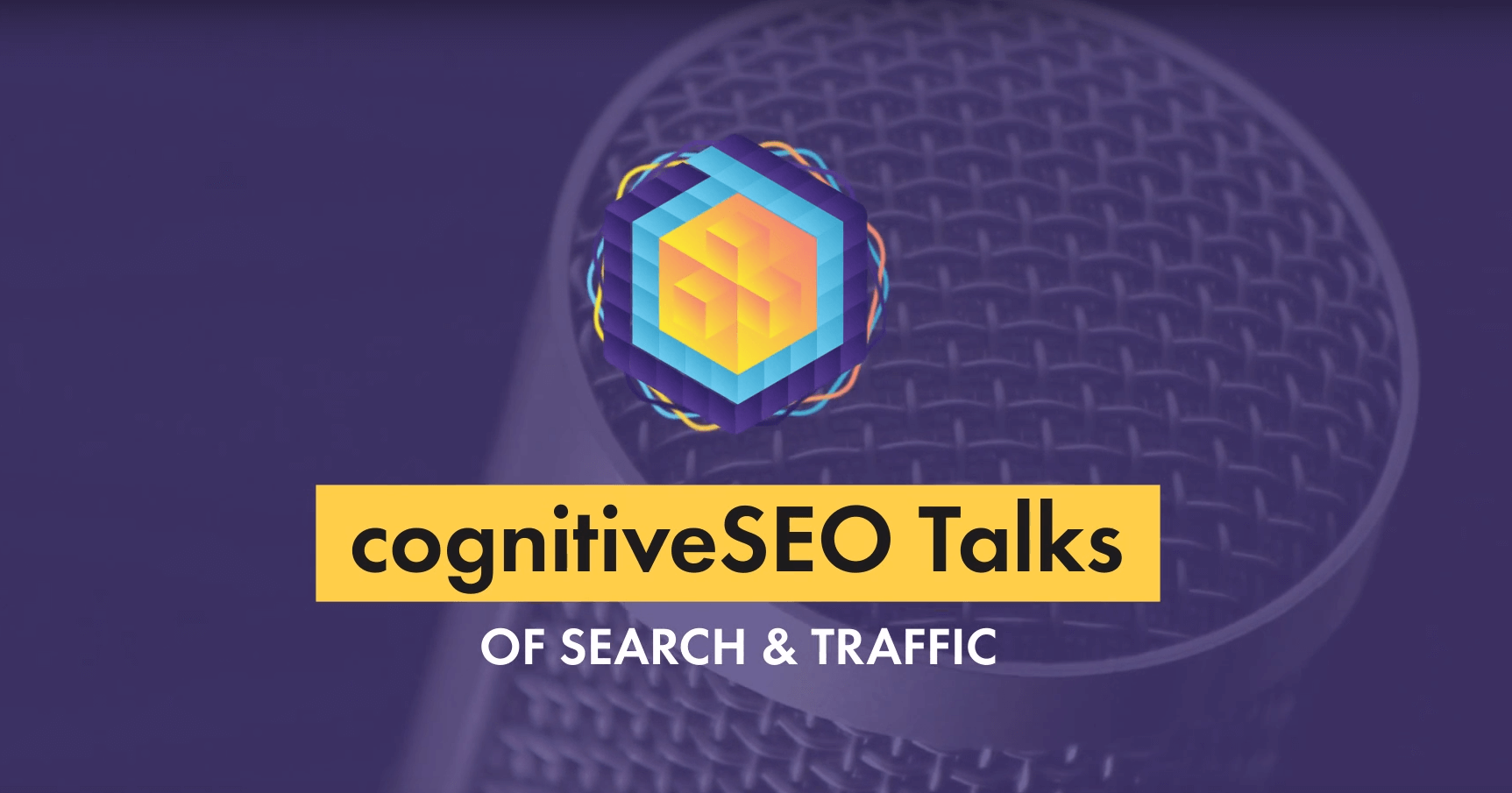
If you’re a Facebook user or Twitter user, then create video content there and share it with your target audience. Make sure your video has a high quality and the message is easy to understand. Look at your competitors to see what they are doing (wrong or right).
Use live videos. They are so popular right now. And the great thing about them is whenever you post a live video as a brand on Facebook, it automatically sends a notification to all of your fans that you are live and they can view your video. Take advantage of that.
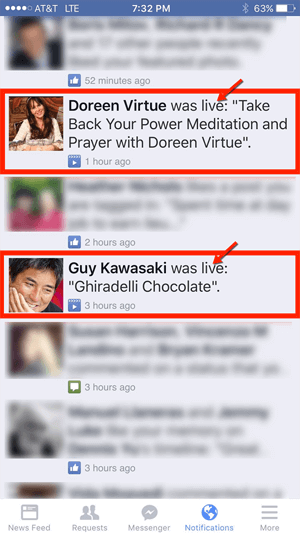
Source: www.socialmediaexaminer.com
Try to talk about what interests your users. Invite them to tell what questions they have. For example, Gary Vaynerchuk’s has the “Ask Gary” live streams on Periscope regularly where he gathers 5-6k simultaneous viewers. Kindly ask them to subscribe or like the video at the end, as that is a common practice.
10. Native Advertising Is Rising Rapidly
Native advertising is known to take the lead and grow faster in the years that will come. Just like personalization had a great impact on the audience, native advertising has a higher chance to convert the viewers.
A research by Native Advertising Institute says that more publishers are adopting native advertising. 51% of them already have. In the same research, it is stated that an overwhelming number of publishers (82%) are positive toward native advertising.
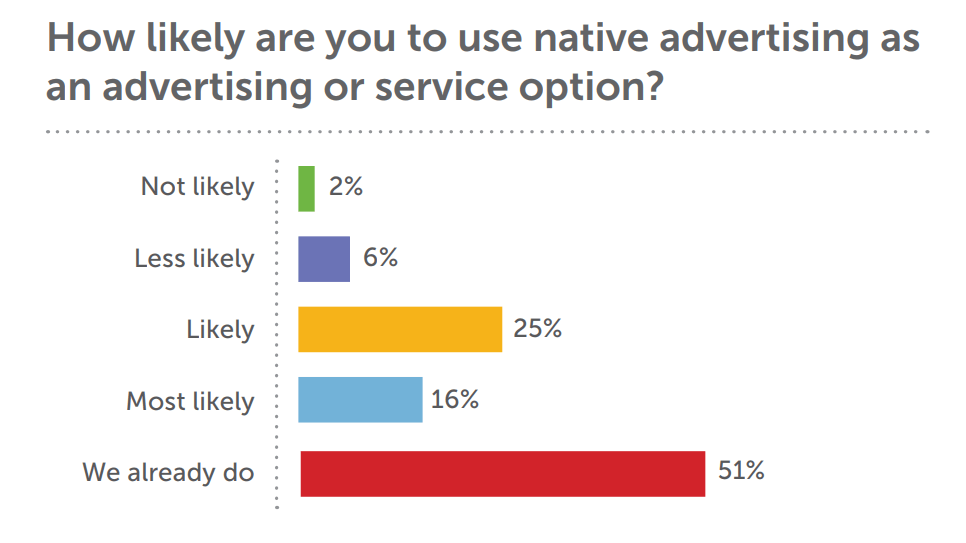
All these numbers can work very well for you and can bring you revenue if you decide to use a native advertising campaign. There are platforms that can help you share high-quality content and increase the number of traffic through content amplification. Outbrain and Taboola are two examples of content distribution platforms where content sharing is very easy to implement.
A good example of a successful native advertising campaign is the one from CNN. They used a native advertising campaign that helped them increase their revenue by 60%. Create was the team that was responsible for the development, production, and delivery of all branded content for CNN International Commercial clients.
In early 2016, CNNIC established a partnership with Sharethrough, a distribution software that helps publishers manage their native content over many different platforms. Sharethrough personalized a product for CNN International Commercial which allowed it to manage its native content over all the CNN-owned platforms.
| Branded content and native advertising has exploded in the last couple of years. It is an upward trend that other publishers are also experiencing. | |
| James Hunt | |
| Vice President Create Group, CNN International Commercial’s in-house marketing and global brand studio | |
Conclusion
Content marketing is a changing industry just like any other. We were witnesses at the video content that changed the rules of how we see content nowadays, becoming at one point of the most preferred type of content. Influencer marketing comes quickly in the forefront and if you use the right influencer and concept you have a high chance to craft great content around it and create word-of-mouth that will mean: brand awareness, more content, higher visibility, and increased traffic.
The focus will fall on the personalization, context and natural language in your articles. Everybody is looking for experiences. That’s one of the reasons why native advertising has increased so rapidly and will grow even higher. Paid advertising can be an excellent choice if you are using it for content amplification to promote various content formats you have available on your website. All editorial calendars should include content distribution.
The recommendations from our article will help you get started with making your content trend-approved. Kick your marketing approach a notch. Follow the guidelines and implement a better content strategy to achieve your marketing goals. Your content makreting efforts will pay off.
The post 10 Content Marketing Trends That Will Affect Your SEO Strategy appeared first on SEO Blog | cognitiveSEO Blog on SEO Tactics & Strategies.
SEO Blog | cognitiveSEO Blog on SEO Tactics & Strategies

No comments:
Post a Comment